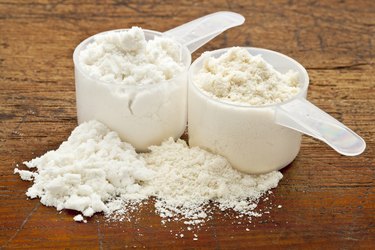
Whey protein is a fast-digesting protein that constitutes 20 percent of milk protein. It's normally consumed in powder form by athletes and bodybuilders to increase protein intake and improve body composition. Whey protein doesn't cause heart problems, but may instead improve heart health. Consult your health care provider before taking whey protein supplements.
LDL Cholesterol
Video of the Day

Although cholesterol is necessary for overall health, too much cholesterol, particularly LDL, can be deposited into artery walls and increase your risk for cardiovascular disease. Whey protein may be effective for lowering LDL cholesterol, according to a study conducted by researchers at Curtin University of Technology in Western Australia. They discovered that adults who had obesity or overweight and consumed whey protein for 12 weeks lowered their LDL cholesterol levels compared with those who took casein protein, according to research published in the September 2010 issue of the "British Journal of Nutrition."
Video of the Day
Blood Pressure

Elevated blood pressure forces your heart to work harder to pump blood through the aorta, the main artery sending blood to the rest of the body. Researchers at Curtin University of Technology in Western Australia studied the effects of whey protein supplementation on blood pressure in adults with overweight. They observed that subjects taking whey protein experienced reductions in blood pressure compared with those who had casein protein or glucose. The findings were published in the July 2010 issue of "Obesity."
Blood Flow

Increasing blood flow to your heart is vital for proper heart function, since blood carries oxygen and nutrients the heart needs. In research published in the July 2009 issue of "Nutrition Journal," scientists at the University of Connecticut discovered that subjects taking whey protein before exercise experienced increases in blood flow compared with those who had a placebo.
Safety

High protein diets have often been labeled unsafe, especially for your kidneys. However, research doesn't support this. Scientists at the University of Colorado found that adolescents who had obesity and adhered to a high-protein diet for 36 weeks experienced no adverse effects on overall health compared with those who followed a low-fat diet, according to research published in the August 2010 issue of the "Journal of Pediatrics."
- British Journal of Nutrition: Effects of Whey Protein Isolate on Body Composition, Lipids, Insulin and Glucose in Overweight and Obese Adults
- Obesity: The Chronic Effects of Whey Proteins on Blood Pressure, Vascular Function, and Inflammatory Markers in Overweight Individuals
- Nutrition Journal: Acute Ingestion of a Novel Whey-Derived Peptides Improves Vascular Endothelial Responses in Healthy Individuals: a Randomized, Placebo Controlled Trial
- Journal of Pediatrics: Efficacy and Safety of a High Protein, Low Carbohydrate Diet for Weight Loss in Severely Obese Adolescents